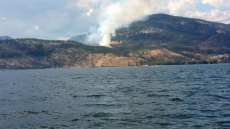HALIFAX — A top Canadian meteorologist warns that municipalities aren't prepared to deal with the impacts of an increasingly volatile climate that can bring devastating floods one season and a drought the next.
In the last five years, Canadian cities have been buried in record-breaking snowfall, scorched by unprecedented wildfires, blasted by tornadoes, hurricanes and lightning strikes, limping from one natural disaster to the next as the bills for emergency repairs climb.
Yet a senior climatologist with Environment Canada says municipal officials continue to build infrastructure based on decades-old weather patterns that are no longer the norm, leading to potentially disastrous consequences.
"You've got to keep pace with it and we haven't kept pace with it," David Phillips said in a recent interview.
The Federation of Canadian Municipalities, which is calling on the next federal government to invest an extra $1.5 billion a year in infrastructure, says that's easier said than done.
"Municipalities are ready, willing and able...What we need is stable, long-term funding sufficient to cover off these costs that we know are already in a deficit position," president Raymond Louie said Friday from Vancouver.
Phillips said rising global temperatures don't mean summer in January, but rather what he refers to as "weather whiplash" - extreme shifts in weather from one season to the next.
Torrential rain swamped Saskatchewan last summer, overwhelming sewer systems and causing flooding as far away as Manitoba. This year, raging wildfires are gobbling up thousands of square kilometres of parched land in the Prairies and British Columbia.
Storms aren't necessarily getting stronger, said Phillips, but our aging buildings, stormwater systems and seawalls are taking more of a beating.
Consider a nasty nor'easter racing up the Atlantic coast, packing the same punch as one four decades ago. Now sea levels are higher and the coastline is dotted with pretty cottages loaded with big-screen TVs and other pricey electronics.
"That storm...is going to inundate more because the ocean is higher," said Phillips. "And if there's neighbourhoods or people living there, well, it's going to be more insurance loss."
The Insurance Bureau of Canada said insurance claim payouts from severe weather events were not notable prior to 2011.
They now average around $1 billion a year. In 2013, they hit a record high of $3.6 billion.
Amanda Dean, the bureau's Atlantic vice-president, said home insurance claims in Newfoundland and Labrador alone have skyrocketed 493 per cent over the last 20 years.
The cause? "The weather," she said. "It's absolutely the weather."
Dean said the home insurance industry was founded to protect homeowners in the event of a fire, but water now poses the biggest threat. She said insurance companies are actively working to minimize payouts amid increasing risk.
"Our member companies have said it's not good enough that they just have to keep increasing premiums in order to keep that pool of money there to pay out all those claims that are coming in."
For that reason, the bureau helped create the Municipal Risk Assessment Tool, an online system that uses municipal infrastructure data, climate data and insurance data to pinpoint weak spots in stormwater and wastewater infrastructure. Launched two years ago as a pilot project in Fredericton, Hamilton and Coquitlam, B.C., the database is accurate within a couple of blocks, said Dean.
The Canadian Federation of Municipalities estimates a $100,000 stormwater structure placed in the right area could save up to $10 million in flood damage.
"We want smart investments," said Louie. "We know that if we were to better invest in our infrastructure today, these avoided costs would be so much more beneficial for Canadians overall."
And there are signs that municipal governments are starting to make some of those critical investments to help avert major damage.
In Halifax, work is underway using the latest technology to upgrade the floodplains map of the Sackville and Little Sackville rivers for the first time since the early 1980s. Along the city's northwest arm, an eroding seawall is being replaced to better withstand crashing waves.
"It's iterative," said John Charles, city planner. "We're always moving forward and learning from the past."
Phillips said he believes "enlightened" municipal governments will be willing to invest in more resilient infrastructure and ask questions about where our climate is heading.
"The climate is changing so dramatically, so quickly, that we need to think of this in a different way and to adapt," he said. "Just because we don't know everything about climate doesn't mean we should ignore what we do know about it."




